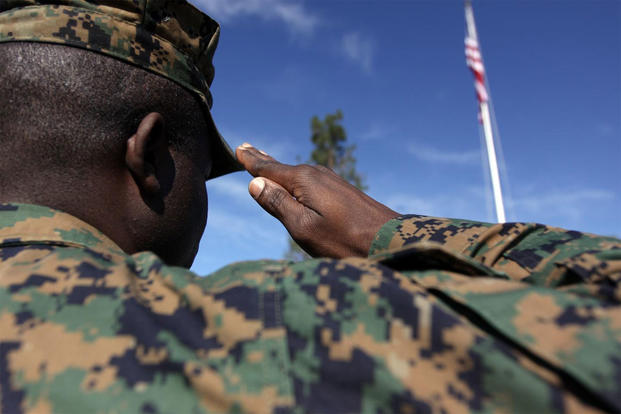In its latest effort to improve recruiting strategies and diversify the force, the Marine Corps is conducting a service-wide research project aimed at understanding "the current mindset of African American youth" and asking active-duty Marines to participate in focus groups.
The project is one of two being spearheaded by Marine Corps Recruiting Command. The other, "Understanding the Prospect Enlistment Behavior Model," aims to project the "thoughts, perceptions and actions" of prospective Marine recruits as they come to a decision point about joining the Corps, said Jim Edwards, a spokesman for the command.
Research on these topics is taking place at Camp Lejeune, North Carolina, and Camp Pendleton, California, Edwards said.
An advertisement for Camp Lejeune troops reviewed by Military.com invited African American Marines at the rank of lance corporal and below for enlisted and captain and below for officers to pariticipate in one-on-one interviews on the first topic. Marines of any race or gender of the same ranks were invited to participate in officer and enlisted focus groups on the second.
"Our marketing department is constantly evaluating the effectiveness of advertising models and initiatives in order to best support our Marine recruiters and officer selection officers," Edwards said in a statement. "These topics were chosen in support of our enduring efforts to recruit future Marines from diverse backgrounds."
The Marine Corps has made no secret of its interest in developing a more diverse force.
Statistically the youngest, most junior and most male of all the military services, the Corps also skews strongly caucasian, particularly in the senior ranks. African-American and black Marines make up roughly 12 percent of all enlisted troops, according to Marine Corps data from February. Less than 6 percent of Marine officers are black, and only 10 general officers in the entire force are non-white.
In 2012, the Marine Corps launched an advertising campaign aimed at attracting black and female officer candidates. Officials cited the importance of developing role models for female and minority enlisted troops in creating the ads, which showed Marine officers leading in their home communities as well as in uniform.
"What distinguishes certain groups, particularly African-Americans, is that they are closely associated with their communities at home," Maj. Gen. Joseph Osterman, then head of Marine Corps Recruiting Command, told The New York Times at the time.
In 2013, then-Marine Corps Commandant Gen. Jim Amos published a memo to Marine leadership saying the Corps had "failed" in promoting diversity in its officer ranks. It was "imperative that the Corps take a fresh approach to diversity, one that reflects our reputation for performance and leadership," Amos wrote.
Edwards said quantitative and qualitative data from the current research projects would be compiled and used to inform future recruiting efforts and campaigns.
"Targeted studies toward specific demographics have been part of our marketing program for several years, to include research focused on races and gender," he said.
A list of recent Marine Corps recruiting research projects provided to Military.com included a study of Asian-American youth in 2013, Hispanic recruiting market research in 2014, and female recruiting studies in 2013 and this year.
Marine Corps Commandant Gen. Robert Neller told The Associated Press this month that the service is taking steps to reach his goal of increasing the number of women in the Marines to 1 in 10, up from roughly 7 percent today, using mailings and meetings with coaches of high school sports to reach prospective recruits.
--Hope Hodge Seck can be reached at hope.seck@military.com. Follow her on Twitter at @HopeSeck.






























